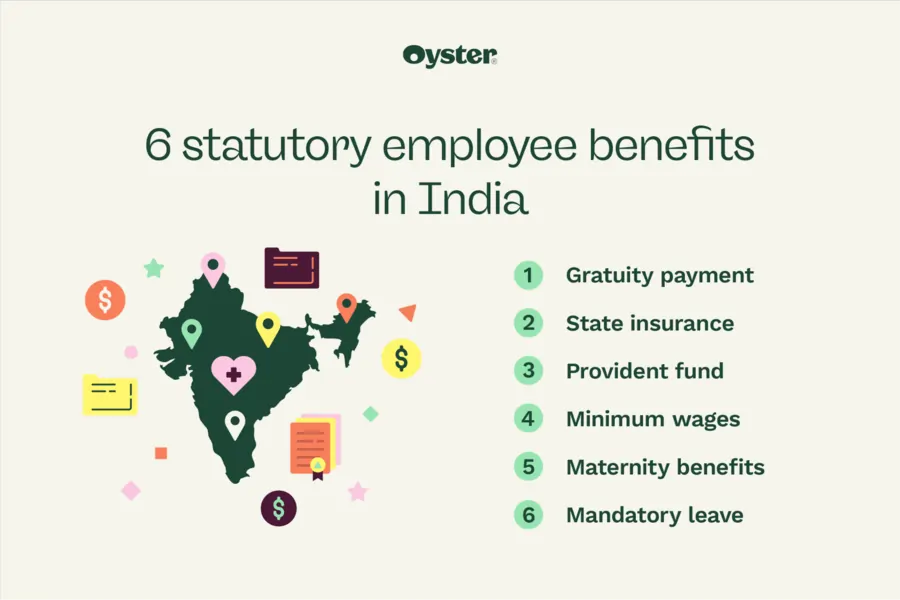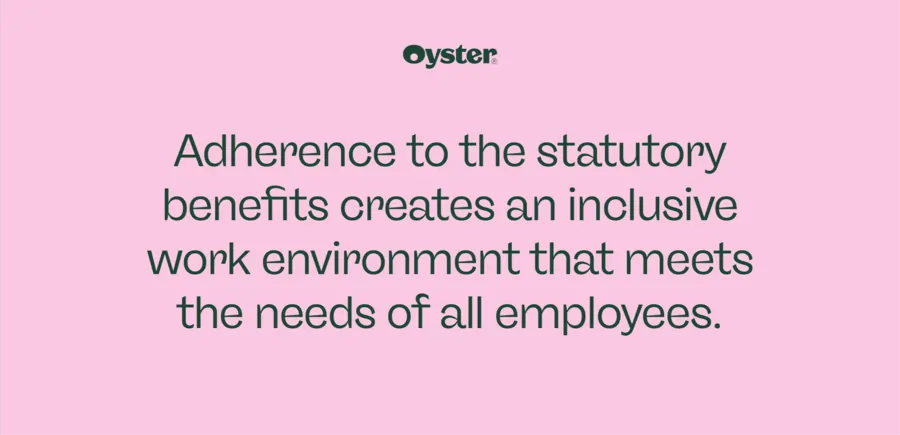A company’s benefit package is one way for employers to communicate and execute on their company culture and values, to attract top talent globally, and to boost employee satisfaction. One study revealed that 78% of employees reported that they’re more likely to stay with an employer because of their benefits program.
In addition to attracting talent, comprehensive benefits packages are required for legal compliance. As an employer looking to hire internationally, it’s important to remain updated on the labor laws and requirements for the countries represented on your team.
In this article, you’ll learn about the statutory benefits that employers need to consider to remain competitive and compliant when hiring in India.
What’s the difference between statutory and non-statutory benefits?
First, let’s get some common definitions cleared up. When it comes to benefits and regulations, there’s often a lot of legal jargon to navigate. In the upcoming sections, we’ll break down some of the different laws and regulations into an accessible format, but you’ll need a basic understanding of the two types of benefits to begin with: statutory benefits and non-statutory benefits.
Statutory benefits refers to labor benefits that are implemented and required by the government. Some common examples of statutory benefits include social security, Medicare, unemployment insurance, and work injury insurance, just to name a few.

Non-statutory benefits, in contrast, are not required by law and include benefits such as health insurance, dental insurance, disability insurance, and pension plans. While these benefits are not mandatory, they are an excellent way for an employer to differentiate themself and attract top talent.
List of statutory employee benefits in India

Gratuity payment
Gratuity payments are welfare payments made to employees who retire, resign, become disabled or pass away, or are under superannuation.
Employees who have worked for their employer for over 5 years are entitled to receive a gratuity payment equivalent to 15 days of wages for every year of employment. This does not apply to employees who are terminated for misconduct or gross negligence.
The Payment of Gratuity Act, 1972 sets the employer gratuity requirements and applies to employees working in factories, mines, oilfields, plantations, ports, railway companies, shops, or other establishments with 10 or more employees.
State insurance
Under the Employees’ State Insurance Act, 1948 (ESI), companies with 10 or more employees must extend benefits to any employee making under 21,000 Indian Rupees (INR) per month. These benefits are offered in cases of sickness, maternity, and employment injury.
Individuals covered by the ESI are entitled to receive medical treatment for themselves and their dependents, unemployment cash benefits, maternity benefits, and a disablement benefit.
The financing for these benefits are paid by both the employer and employee. Employer contributions are equivalent to 4.75% of payable wages and employee contributions are equivalent to 1.75% of payable wages. Employees who make under INR 137 per day are exempt from paying their contribution.
Provident fund
The Employees Provident Fund and Miscellaneous Provisions Act, 1952 sets the regulations for employee provident funds. The Employee Provident Fund (EPF) is a scheme to offer benefits to factory workers at companies with 20 or more employees. This is a requirement for any employee whose salary is equal to or less than INR 15,000 per month.
Like with State Insurance, both employers and employees contribute a percentage of the monthly wages to the scheme. For employees in specific fields, the provident fund is compulsory and they must contribute 10% of their salary to the fund. The employer matches the contribution (10%) and the government contributes 1.16%. For those that the Provident Fund Act doesn’t cover, this benefit becomes voluntary. As a result, there is no set percentage that the employer or employee must contribute.
The employee receives the payment from the scheme, including interest, upon retirement. Typically, employees must wait until they are at least 55 years old to withdraw the full amount.
Minimum wages
The Minimum Wages Act, 1948, sets the minimum wage for all workers in India. There isn’t a uniform wage rate, as wage rates differ across states, skills, and sectors to account for variations in cost of living and industry capacity to pay.
Maternity benefits
The Maternity Benefit Amendment Act, 2017 (the Amendment Act) brought significant changes to outdated maternity laws governing the required benefits for pregnant women and put India ahead of many developing countries.
The requirements set under the Amendment Act apply to any company that employs 10 or more individuals. Benefits include mandatory maternity payment benefits for women, regardless of income, as well as maternity leave and work from home provisions for nursing mothers. New mothers who just gave birth are entitled to 26 weeks of maternity leave. Adoptive mothers and commissioning mothers (those who used a surrogate) may receive 12 weeks of maternity benefits.
Paternity leave is not included in the Amendment Act and is not considered a mandatory benefit. However, some employers may elect to grant paternity leave as a non-statutory benefit.
Additionally, any company with over 50 employees is required to provide a daycare facility. These facilities may be shared with neighboring companies. The mother must be given the ability to access the daycare facilities four times a day.
Mandatory leave
There are three national holidays for which all employees must be given paid time off: Republic Day (January 26), Independence Day (August 15), and Gandhi Jayanti (October 2). Other festive holidays may also be given depending on the State of employment.
Outside of the national holidays, The Factories Act requires 12 days of leave for employees that have worked at least 240 days in a year. The amount of paid leave that can carry over year to year varies based on the State of employment, ranging from 30 days to 60 days.
Please note that these are just some of the statutory benefits in India, and this list is not exhaustive. As an employer, if you need help understanding which statutory benefits are required for Indian employees, you should seek legal advice.
Why learning about statutory benefits for employees in India is important when hiring distributed talent
Stay compliant when hiring internationally
It is important as an employer with Indian employees to remain conscious of the local laws and regulations regarding statutory benefits. By remaining mindful of these requirements, you can ensure legal compliance and avoid any potential issues.
All employees—regardless of location—should have an inclusive work experience

Adherence to the statutory benefits also ensures that you, as the employer, are proactively creating an inclusive work environment that takes into consideration the various needs of the employees. For example, maternity benefits ensure women are supported in the workforce, while minimum wages ensure that employers pay a fair wage to all employees regardless of education or skill level.
How to discover more about employee benefits in India
Laws and regulations are constantly reviewed and updated. It is important to maintain a current understanding of the statutory benefits. You can visit the Ministry of Labor & Employment website in order to learn more about the policies and regulations set by the government.
Oyster has also compiled a global hiring guide for how to hire employees in India to help you gain a broad understanding of the main employer requirements.
Offering competitive benefits will ensure you attract and retain top talent
The statutory benefits that are required by law serve to protect workers and ensure that employers maintain ethical employment practices. Beyond what is required, non-statutory benefits can also allow companies to stand out and attract the best employees.
Employees should have a clear understanding of the benefits that they are required to contribute to and any of the non-statutory benefits that the company offers. Clear communication from the company’s HR department is essential to ensure employees understand how to maximize their benefits package.
Ready to hire your first employee in India? Learn about how Oyster can help you easily hire, pay, and take care of your team—wherever they are.
Disclaimer: This blog and all information in it is provided for general informational purposes only. It does not, and is not intended to, constitute legal or tax advice. You should consult with a qualified legal or tax professional for advice regarding any legal or tax matter and prior to acting (or refraining from acting) on the basis of any information provided on this website.
About Oyster
Oyster is a global employment platform designed to enable visionary HR leaders to find, hire, pay, manage, develop, and take care of a thriving distributed workforce. Oyster lets growing companies give valued international team members the experience they deserve, without the usual headaches and expense.
Oyster enables hiring anywhere in the world—with reliable, compliant payroll, and great local benefits and perks.









.avif)





_Leader_Leader%201%20(2)%20(3).svg)
_Leader_UnitedKingdom_Leader%201%20(1).svg)
_Leader_Europe_Leader%201%20(1).svg)
_Leader_Mid-Market_Leader%201%20(1).svg)
_Leader_Small-Business_Europe_Leader%202%20(2).svg)
_Leader_Small-Business_Leader%201%20(1).svg)
_FastestImplementation_Small-Business_GoLiveTime%201%20(1)%20(1).svg)